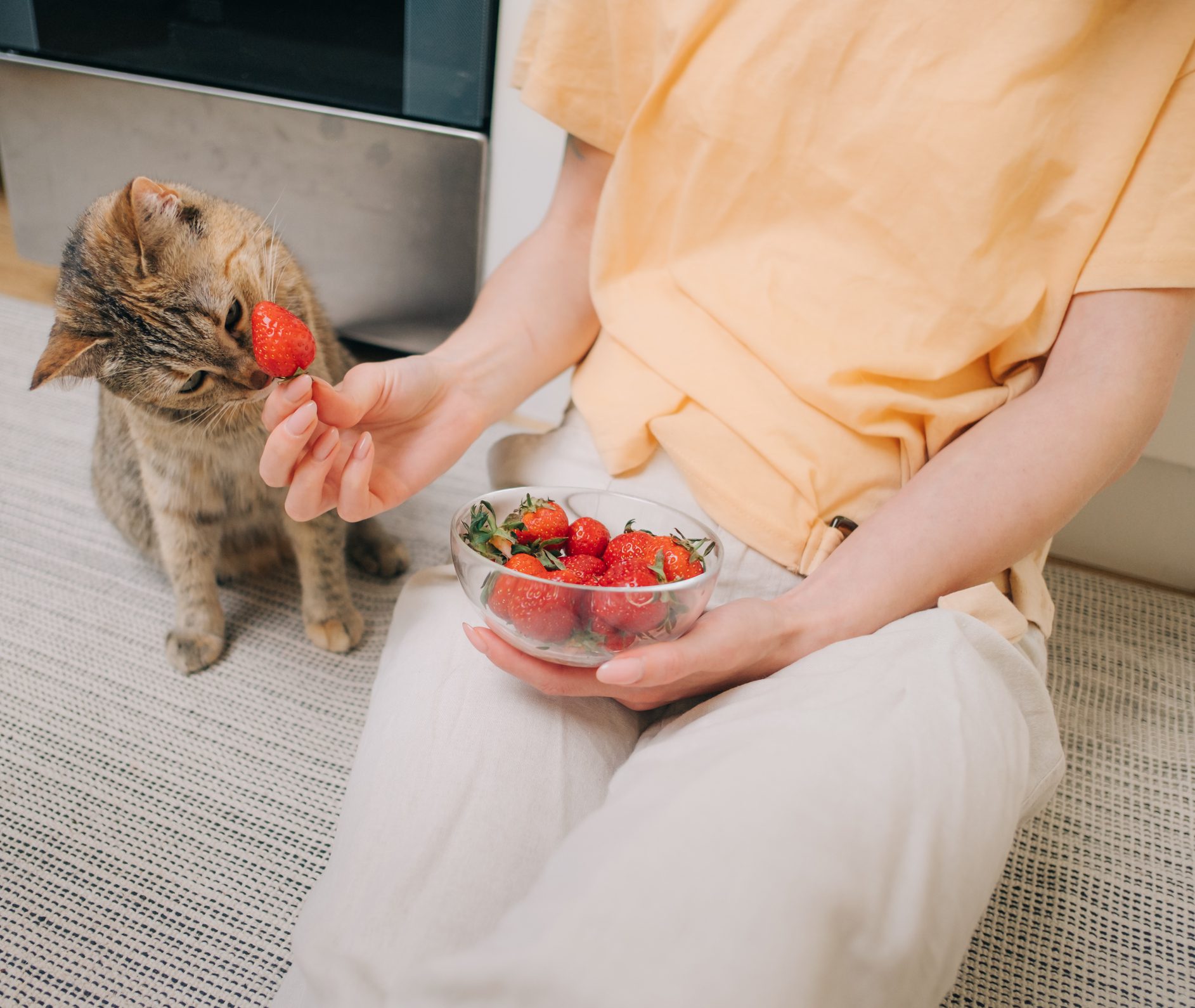Cats are notoriously known for their finicky and unique eating habits. Unlike their canine counterparts, felines tend to be more selective, often ignoring foods that don’t appeal to their carnivorous nature. This instinctive behavior stems from their wild ancestry and their status as obligate carnivores, which means they primarily require nutrients found in animal products. However, every so often, a curious whiskered friend might paw at a juicy strawberry from your fruit salad, leading you to wonder, “Can cats eat strawberries?”
The Strawberry Verdict: Can Cats Eat Strawberries Safely?
The simple answer is yes, cats can indeed eat strawberries. Strawberries are not listed among foods toxic to cats by the American Society for the Prevention of Cruelty to Animals (ASPCA). But this doesn’t necessarily mean they make for an ideal cat treat. Despite their non-toxic status, strawberries provide little nutritional value to our feline friends. While you might delight in their tangy sweetness, your cat doesn’t perceive sweetness like humans do due to their lack of certain taste receptors.
The Nutritional Discrepancy in Strawberries for Cats
Strawberries, like other fruits, are packed with vitamins, antioxidants, and fiber, beneficial for humans and some animals. However, cats’ unique dietary requirements mean these nutrients aren’t essential to them. Felines require taurine, a type of amino acid predominantly found in meat, critical for their heart health, vision, and reproduction. Unfortunately, strawberries don’t supply this key nutrient.
Safe Strawberry Consumption for Cats
If your cat shows interest in strawberries and you decide to share, it’s crucial to follow safe feeding practices. Serve strawberries in moderation. An occasional small piece won’t harm your cat, but too many can lead to digestive upset due to their high fiber content. Always thoroughly wash strawberries before serving to remove any residual pesticides, and avoid giving your cat the leaves or stem, as these could pose a choking hazard.
Monitoring Your Cat’s Reaction to Strawberries
When introducing any new food into your cat’s diet, it’s important to closely monitor their reaction. While strawberries are not toxic, some cats may have individual allergies or sensitivities. Signs of an adverse reaction can include vomiting, diarrhea, itching, or changes in behavior. If you notice any of these symptoms, stop feeding the strawberry immediately and consult your veterinarian.
Feline Fruit Toxicity: Fruits to Avoid
While strawberries may be safe, several other fruits are not. Grapes, raisins, and currants, for instance, can cause kidney failure in cats. Citrus fruits, including lemons, limes, grapefruits, and oranges, contain psoralens and essential oils that can cause gastrointestinal upset and central nervous system depression. Always consult your vet before introducing a new fruit into your cat’s diet.
Final Thoughts: The Role of Fruit in a Cat’s Diet
Ultimately, cats do not need fruit in their diet. Their bodies are designed to derive essential nutrients from animal-based foods. While an occasional strawberry treat won’t harm your feline friend, it’s best to stick to vet-approved cat treats for their health and wellbeing. Remember, while we can provide some general information on feline diets, it’s always best to consult your veterinarian for personalized advice for your furry friend.
Here at the Rutherford Veterinary Hospital in Dallas, TX, our dedicated team of professionals is always ready to provide expert care and advice for your pets. Call us at (214) 826-4166 for an appointment, or schedule an appointment online.
Need More Pet Nutrition Information?
Our commitment to your pet’s health goes beyond office visits. We continually update our blog with useful information about pet nutrition, health tips, and more. Whether you’re wondering about the potential benefits or risks of a new diet trend, or you’re curious if your cat can eat strawberries, we have you covered. Stay informed and keep your pet safe with Rutherford Veterinary Hospital.


 Have an Emergency?
Have an Emergency?